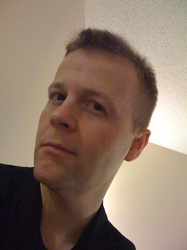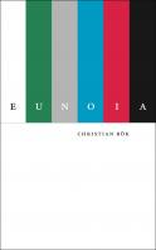 Christian Bök Christian Bök is the author not only of Crystallography (Coach House Press, 1994), a pataphysical encyclopedia nominated for the Gerald Lampert Memorial Award, but also of Eunoia (Coach House Books, 2001), a bestselling work of experimental literature, which has gone on to win the Griffin Prize for Poetic Excellence. Bök has created artificial languages for two television shows: Gene Roddenberry’s Earth: Final Conflict and Peter Benchley’s Amazon. Bök has also earned many accolades for his virtuoso performances of sound poetry (particularly Die Ursonate by Kurt Schwitters). His conceptual artworks (which include books built out of Rubik’s cubes and Lego bricks) have appeared at the Marianne Boesky Gallery in New York City as part of the exhibit Poetry Plastique. The Utne Reader has recently included Bök in its list of “50 Visionaries Who Are Changing Your World.” Bök teaches English at the University of Calgary. RUSTY TALK WITH CHRISTIAN BÖK Kathryn Mockler: How did you first come to writing? Christian Bök: When I was four years old, I was seated on the knee of Santa Claus at a shopping mall, and when quizzed about what I wanted for Christmas, I requested a typewriter. Even though St. Nick tried to talk me out of this oddball request, I nevertheless insisted—and to the credit of my parents, they bought me a plastic green typewriter, which I used to recopy pages from an encyclopedia of machines (my favourite book at the time...). I could not read, of course, so I hunted and pecked my way through the text, typing out the pages, merely by comparing the symbols in the encyclopedia with the symbols found on the keyboard. To me, this was writing.... KM: How would you describe experimental/conceptual writing to someone unfamiliar with the genre? CB: Works of conceptual literature have primarily responded to the historical precedents set by two disparate movements in the avant-garde: first, the systematic writing of Oulipian pataphysicians (like Queneau, Roubaud, et al.); second, the procedural artwork of American conceptualists (like Kosuth, Huebler, et al.)—precedents that, in both cases, reduce creativity to a tautological array of preconceived rules, whose logic culminates, not in the mandatory creation of a concrete object, but in the potential argument for some abstract schema. Ideas that we conceive for works now become systemic “axioms,” and the works that we generate from these ideas now become elective “proofs.” The concept for the artwork now absorbs the quality of the artwork itself. The idea for a work supplants the work. The idea renders the genesis of the work optional, if not needless. For the proponents of conceptual literature, a writer no longer cultivates any subjective readerships by writing a text to be read, so much as the writer cultivates a collective “thinkership”—an audience that no longer even has to read the text itself in order to appreciate the importance of its innovation. KM: How did you get interested and involved with it? CB: Darren Wershler and I made a pilgrimage from Toronto to Buffalo in the late 1990s, in order to see a performance at SUNY by the poet Kenneth Goldsmith (whom I wanted to meet after reading his book "No. 111"). We struck up an immediate friendship with him, and all of three of us were very enthusiastic to discover that our poetic output was converging toward a set of shared motifs about the "concept" of poetry itself--and so, over beers at a bar in Buffalo, we decided to found an avant-garde school of writing (which eventually adopted the moniker of Conceptual Literature...). KM: What artists, writers, poets would you recommended to someone aspiring to be an experimental writer? CB:Recommended texts are probably too numerous to mention—so I am just going to cite a few titles by some younger, Canadian poets in the hope that your students might use them as launching platforms into their own exploration of the influences upon many of my peers in the field…. Derek Beaulieu: How to Write Greg Betts: If Language Jeff Derksen: Transnational Muscle Cars Helen Hajnoczky: Poets and Killers Kelly Marks: Important Instructions for Changing the World Lisa Robertson: The Weather Jordan Scott: Blert Sina Queyras: Lemon Hound Darren Wershler: The Tapeworm Foundry Rachel Zolf: Human Resources KM: Do you have a piece of advice for those entering the genre? CB: Poetry is a test of endurance, not of merit. Write in a manner that surprises you. Strive to make, heretofore unknown, pataphysical discoveries about the unexplored potential of language itself. KM: What are you working on now? CB:I am currently striving to address the sociological implications of biotechnology by manufacturing, what I call, a “xenotext”—a beautiful, anomalous poem, whose “alien words” might subsist, like a harmless parasite, inside the cell of another life-form. I am striving, in effect, to create an example of “living poetry.” I have written a short verse about language and genetics, whereupon I have used a “chemical alphabet” to translate this poem into a sequence of DNA for subsequent implantation into the genome of a bacterium called Deinococcus radiodurans (an extremophile, capable of surviving in even the most hostile milieus, including the vacuum of outer space); moreover, I have composed this poem in such a way that, when translated into the gene and then integrated into the cell, the text nevertheless gets “expressed” by the organism, which, in response to the inserted, genetic material, begins to manufacture a viable, benign protein—one that, according to the original, chemical alphabet, is itself another text. I am engineering a life-form so that it becomes not only a persistent archive for storing a poem, but also a functional machine for writing a poem—a poem that, I hope, might literally survive forever, existing on the planet until the very day when the sun explodes….  CHRISTIAN BÖK'S MOST RECENT BOOK Eunoia, Coach House Books, 2009, ed. Description from Coach House Books: The word ‘eunoia,’ which literally means ‘beautiful thinking,’ is the shortest word in English that contains all five vowels. Directly inspired by the Oulipo (l’Ouvroir de Littérature Potentielle), a French writers’ group interested in experimenting with different forms of literary constraint, Eunoia is a five-chapter book in which each chapter is a univocal lipogram--the first chapter has A as its only vowel, the second chapter E, etc. Each vowel takes on a distinct personality: the I is egotistical and romantic, the O jocular and obscene, the E elegiac and epic (including a retelling of the Iliad!). Stunning in its implications and masterful in its execution, Eunoia has developed a cult following, garnering extensive praise and winning the Griffin Poetry Prize. The original edition was never released in the U.S., but it has already been a bestseller in Canada and the U.K. (published by Canongate Books), where it was listed as one of the Times’ top ten books of 2008. This new edition features several new but related poems by Christian Bök and an expanded afterword. 'Eunoia is a novel that will drive everybody sane.' – Samuel Delany 'Eunoia takes the lipogram and renders it obsolete.' – Kenneth Goldsmith 'A marvellous, musical texture of rhymes and echoes.' – Harry Mathews 'An exemplary monument for 21st century poetry.' – Charles Bernstein 'Bök's dazzling word games are the literary sensation of the year.' – The Times 'A resounding success ... brilliant.' – The Guardian 'Brilliant ... beautiful and strange.' – Today Programme, BBC Radio 4 'Impressive.' – Sunday Telegraph 'No mere Christmas stocking filler for Countdown fans. Rather, it's an ingenious little novel ... playful and irreverent ... charming.' – Metro Comments are closed.
|
Rusty Talk
Rusty Talk Editor: Archives
November 2017
Categories
All
|

 RSS Feed
RSS Feed
